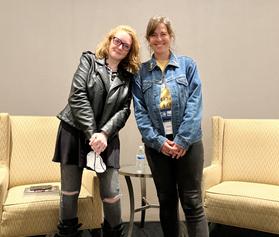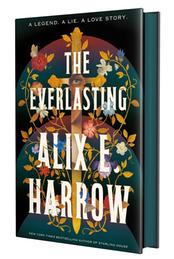In the closing keynote at last week's NEIBA Fall Conference, author Alix E. Harrow described her upcoming title The Everlasting (October 28; Tor Books) as being about "a big sad lady knight stuck in a time loop, and the cowardly historian who is sent back in time to make sure she keeps playing her part." Harrow's fourth novel is "a mix of my childhood obsession with lady knights (or any girl with a sword), becoming an adult, and beginning to examine things like knighthood and chivalry through a different lens." Even though she's a grownup now, she said, "and I know that knights were private security landowners and are kind of a bummer (ACAB includes knights), I'm still swept away by the romanticism of the knight as a hero, as a symbol. The entire medieval world still kind of has that romance for me. But it relies on there being a king worth serving."

|
|
| Liberty Hardy (l.) and Alix Harrow | |
In a conversation with Book Riot senior contributing editor and podcaster Liberty Hardy, Harrow noted that despite growing up reading secondary world fantasy novels, this is her first time writing one. "It was one of the things that intimidated me the most," she said. "I feel like I rely on real history to make books convincing, but it turns out that what mattered most to me in building a secondary world was the way power and hierarchy worked--all of that has to be absolutely familiar." To illustrate this point, Harrow recounted a question from a fan. "You're such a good writer," the fan said. "Why do you write fantasy?" To the audience, Harrow replied, "Excuse me, ma'am, you are coming to the genre of [Ursula K.] Le Guin and you ask me that?"
But it has only been since she has had "a career writing fantasy" that Harrow has considered why she writes it: "You can use the tools of magic to magnify real things. You can talk about agency or women's agency--or you could have an actual witch. It's a way of literalizing the things that are important to us." Also, it was easy to write a protagonist obsessed with lady knights "because I, too, have been obsessed with lady knights."
 Distinctly not easy, she said, was writing a time loop. "I love time loop stories," Harrow explained. "I love time travel as a concept of fiction. And then as soon as you try to plot a book around it, you're like, 'Uh oh, it's really complicated.' " Harrow continued: "I thought I could do it and that it would be fine. I'm never going to do it again. When this book went through copy edits, I had god's favorite copy editor who sent me a 27-page document tracking every time loop." Only once, the copy editor said, did Harrow make a mistake. When Hardy asked Harrow if she would like to time travel herself, the response was quick: "No! The stuff I had to keep track of just to write about it? I would be frozen with terror immediately." What about a tourist time travel trip? "Maybe... Who is in charge of this tour?"
Distinctly not easy, she said, was writing a time loop. "I love time loop stories," Harrow explained. "I love time travel as a concept of fiction. And then as soon as you try to plot a book around it, you're like, 'Uh oh, it's really complicated.' " Harrow continued: "I thought I could do it and that it would be fine. I'm never going to do it again. When this book went through copy edits, I had god's favorite copy editor who sent me a 27-page document tracking every time loop." Only once, the copy editor said, did Harrow make a mistake. When Hardy asked Harrow if she would like to time travel herself, the response was quick: "No! The stuff I had to keep track of just to write about it? I would be frozen with terror immediately." What about a tourist time travel trip? "Maybe... Who is in charge of this tour?"
As Hardy brought the conversation to a close, she asked Harrow what indies mean to her. "You warned me you were going to ask me this question," Harrow said, and reminisced about how a librarian once told her not to pander to a crowd of librarians, telling them that she "grew up spending time in libraries" and "loved" them. With that being said, "I am going to pander. I grew up in Kentucky and there was no indie bookstore nearby. I think the reason I have fond memories of indie bookstores is because of fictional ones like The Neverending Story. I very much had an idea of what a bookstore was before I ever stepped foot in one. So, one of the bigger privileges of having this job is getting to fly around the country and go to bookstores which still feel a little mythical to me. Like, ohmygod, it's just like on TV!" --Siân Gaetano, children's and YA editor, Shelf Awareness

